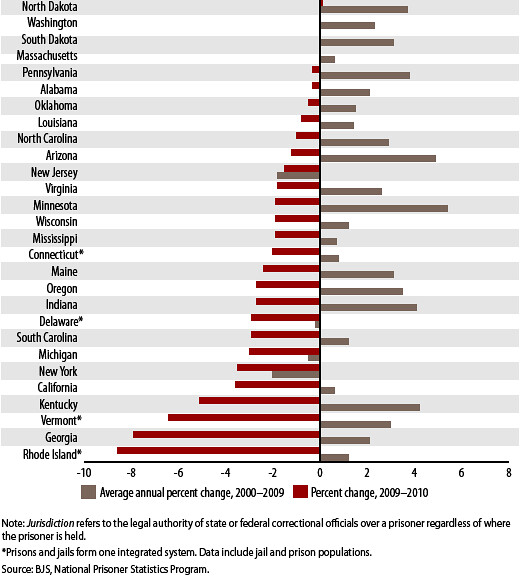Two years ago the Georgia legislature was in denial, as Carrie Teegardin wrote for the AJC 4 April 2010, Georgia prison population, costs on rise,
As Georgia lawmakers desperately search for ways to slash spending, they are not debating an option taken by other states: cutting the prison population.
Georgia operates the fifth-largest prison system in the nation, at a
cost of $1 billion a year. The job of overseeing 60,000 inmates and 150,000 felons on probation consumes 1 of every 17 state dollars.
The state’s prison population has jumped by more than a quarter in the past decade and officials expect the number of state inmates to continue to creep upward. Georgia has resorted to measures other than reducing the prison population to keep corrections spending under control.
19 months later, things had changed, as the Atlanta Business Chronic reported 15 December 2011, BJS: Georgia prison population drops in 2010,
Georgia’s prison system posted the second-largest decrease in inmates in the United States in 2010, according to new data from the U.S. Bureau of Justice StatisticsThe Peach State had 49,164 prisoners under the jurisdiction of state and federal correctional authorities at the end of 2010, compared with 53,371 at the end of 2009. This represents a 7.9 percent drop.
Click here for the full report, which breaks down prison populations by state, gender and race.
Only tiny Rhode Island managed to decrease by a larger percentage of prisoners from 2009 to 2010.
And less than two years after that April 2010 state of denial, the legislative tune has changed. Gloria Tatum wrote for Atlanta Progressive News 12 February 2012, Georgia Considers Reforms to Reduce Prison Population, Costs,
This year, the Georgia Legislature is expected to begin considering a package of reforms intended to reduce the state’s prison population as well as the enormous costs to taxpayers that Georgia’s mass incarceration policies have caused year after year.And they may even be serious about it:
The Governor named the Pew Charitable Trust and Applied Research Services as its consultants.Hm, those could be real consultants.
Now that Georgia has finally gotten over denial about the symptom, how long until the legislature gets around to dealing with the cause?
Georgia’s antiquated and draconian marijuana prohibition laws are responsible for a large percentage of people in jail.So why are we spending our tax dollars to lock them up?“The war on drugs has failed miserably. We have casualties from this
war filling homeless shelters, jails, and graveyards, as victim after victim is disenfranchised and denied any hope for a living wage,” Denise Woodall, a PhD student in Criminology at the University of Miami who was formerly incarcerated, told Atlanta Progressive News.
Currently the State spends more than one billion dollars annually on corrections, and this number keeps going up each year.
The data shows most individuals sentenced to prison are drug and property offenders and they are staying behind bars for longer periods of time. These offenders represent almost sixty percent of all people incarcerated. Many of these people are identified as lower-risk and are less likely to re-offend.
“They are saying [in the report] that there is no issue of public safety with these people; furthermore, they are admitting that they need help not incarceration,” Woodall said.
A majority of Americans now favor legalizing marijuana use. And even Georgia’s law-and-order legislature is actively working on sentencing reform.
And remember, CCA’s 2010 SEC report warns:
The demand for our facilities and services could be adversely affected by the relaxation of enforcement efforts, leniency in conviction or parole standards and sentencing practices or through the decriminalization of certain activities that are currently proscribed by our criminal laws. For instance, any changes with respect to drugs and controlled substances or illegal immigration could affect the number of persons arrested, convicted, and sentenced, thereby potentially reducing demand for correctional facilities to house them.So, why should we invest in a failing business? A failing business funded by our tax dollars?
 If you don’t want a private prison,
here’s a
petition you can sign
to ask the Valdosta-Lowndes County Industrial Authority (VLCIA)
to reject the CCA private prison from Lowndes County, Georgia.
If you don’t want a private prison,
here’s a
petition you can sign
to ask the Valdosta-Lowndes County Industrial Authority (VLCIA)
to reject the CCA private prison from Lowndes County, Georgia.
![]() Or bring your car, truck, motorcycle, or bicycle to the
motorcade against CCA
Tuesday March 6th, from the prison site
to the Industrial Authority office.
Or bring your car, truck, motorcycle, or bicycle to the
motorcade against CCA
Tuesday March 6th, from the prison site
to the Industrial Authority office.
-jsq
Short Link:
